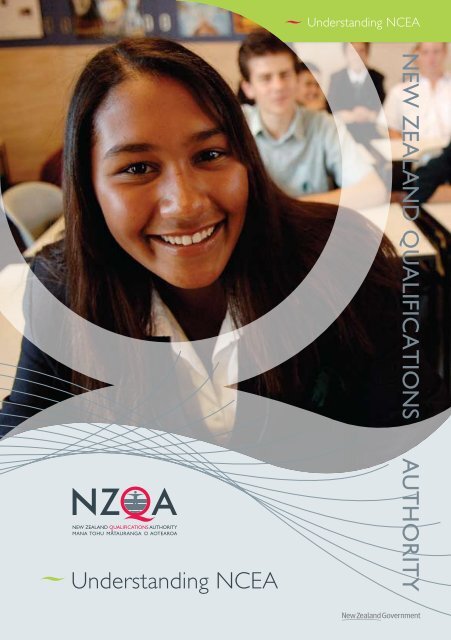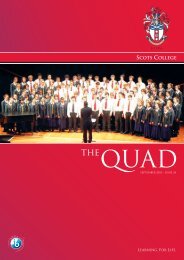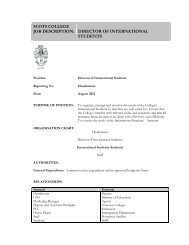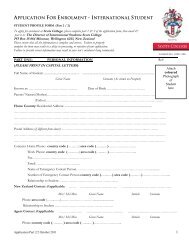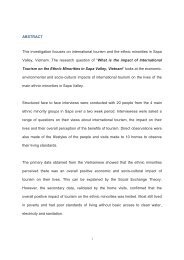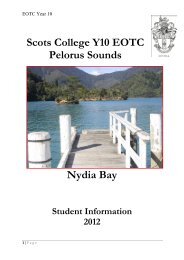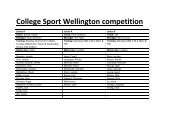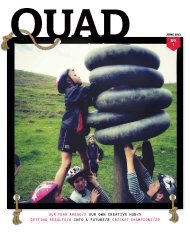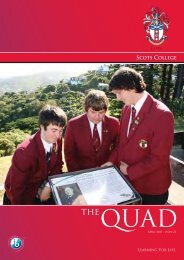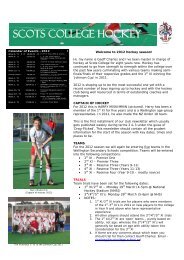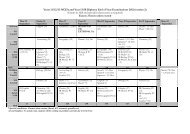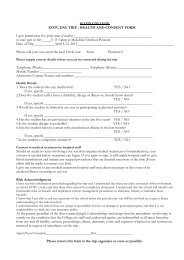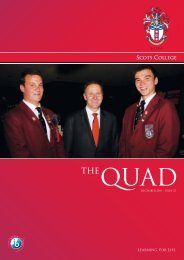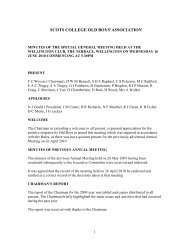Understanding NCEA (NZQA Resource) - Scots College
Understanding NCEA (NZQA Resource) - Scots College
Understanding NCEA (NZQA Resource) - Scots College
Create successful ePaper yourself
Turn your PDF publications into a flip-book with our unique Google optimized e-Paper software.
<strong>Understanding</strong> <strong>NCEA</strong><br />
<strong>Understanding</strong> <strong>NCEA</strong> i<br />
<strong>Understanding</strong> <strong>NCEA</strong><br />
NEW ZEALAND QUALIFICATIONS AUTHORITY
<strong>Understanding</strong> <strong>NCEA</strong><br />
CONTents<br />
THE BASICS<br />
What is <strong>NCEA</strong>?<br />
Inside front cover<br />
Why should I work towards <strong>NCEA</strong>?<br />
Inside front cover<br />
How do I get <strong>NCEA</strong>? 1<br />
THE DETAILS 2<br />
How do I enter for <strong>NCEA</strong>? 2<br />
How should I choose my courses? 2<br />
How do I achieve a standard? 2<br />
How will my work be assessed? 3<br />
How will I be graded in each standard? 4<br />
What happens if I don’t achieve a standard? 4<br />
How many credits do I need for an <strong>NCEA</strong> Certificate? 4<br />
What if I miss out on level 1 <strong>NCEA</strong>? 4<br />
What do I need to gain University Entrance? 6<br />
What other qualifications can I aim for at school? 6<br />
Getting your <strong>NCEA</strong> Results 7<br />
How will I get my results? 7<br />
Can I appeal my results? 8<br />
MORE INFORMATION 8<br />
TIPS FOR PARENTS 9<br />
GUIDE TO THE RESULT NOTICE 10<br />
The basics<br />
What is <strong>NCEA</strong>?<br />
<strong>NCEA</strong> stands for National Certificate of Educational Achievement. <strong>NCEA</strong> is the<br />
most common qualification you will be working towards in Years 11 to 13.<br />
Why should I work towards <strong>NCEA</strong>?<br />
<strong>NCEA</strong> and other national certificates are recognised by employers and used for<br />
selection into courses by universities and polytechnics. <strong>NCEA</strong> is also accepted by<br />
employers and universities overseas.<br />
Independent research* has shown that if you do well in <strong>NCEA</strong>, you are likely to do<br />
well in your first year at university.<br />
• This guide is for students new to <strong>NCEA</strong>. Ask your parents/ guardians to read this guide so<br />
that they understand how <strong>NCEA</strong> works. In particular, get them to read the Tips for parents<br />
section on page 9.<br />
* The Predictability of Enrolment and First Year University Results from Secondary School Performance (Starpath, University of Auckland, 2008).
1<br />
“I’ve employed a lot of young people over the last<br />
couple of years, and reading through their papers<br />
and credits, you do get a good indication of where<br />
they’re at, just going with the credits they have,<br />
the marks they’ve got. <strong>NCEA</strong> tells you a bit more<br />
about the person; if they’re hands-on or computer<br />
skilled or good at fault finding.”<br />
Jud Dwyer, Manager at Westland Milk Products<br />
How do I get <strong>NCEA</strong>?<br />
<strong>NCEA</strong> is gained by building up credits. Credits are awarded for each standard you achieve<br />
in the course you are studying.<br />
• Standards are the skills or knowledge that you are expected to achieve or know in<br />
a course. For example, a Mathematics standard is: Apply numeric reasoning in solving<br />
problems.<br />
• Assessments measure how well you meet these standards. Assessments can be<br />
internal (a test, activity or assignment) or external (an end-of-year exam or portfolio).<br />
• When you achieve a standard, you also achieve a number of credits for that standard.<br />
• When you achieve a certain number of credits, you gain <strong>NCEA</strong>. There are three<br />
different levels of <strong>NCEA</strong> you can get, depending on the difficulty of the standards<br />
you achieve.
2<br />
The DETAILS<br />
How do I enter for <strong>NCEA</strong>?<br />
Your school will enter you for <strong>NCEA</strong> and tell you when to finalise your entries and pay<br />
your fees ($75 each year).<br />
<strong>NCEA</strong> is administered by the New Zealand Qualifications Authority (<strong>NZQA</strong>). You<br />
can use your unique National Student Number (NSN) to look up information <strong>NZQA</strong><br />
holds about you sent in by your school, including your entries, results and Record of<br />
Achievement. For more information see www.nzqa.govt.nz/ncea or phone <strong>NZQA</strong> on<br />
0800 697 296.<br />
How should I choose my courses?<br />
In year 11, you will probably take a broad range of courses that can lead on to more<br />
specialised subjects. In years 12 and 13, you will start thinking about what areas you<br />
need to focus on for your future study or career. If you have a particular career in<br />
mind, check out what courses you will need with your teachers or the place where you<br />
intend to study.<br />
How do I achieve a standard?<br />
When you study a programme or course, your work is measured against pre-set<br />
standards using assessments.<br />
As you study a new topic your teachers will explain to you what is going to be<br />
assessed. Teachers will tell you if you are on the right track or help you to improve<br />
your work.
An assessment programme for a Mathematics course at level 1 may look like this:<br />
3<br />
STANDARD ASSESSMENT NAME OF STANDARD CREDITS<br />
1.1 Internal Apply numeric reasoning in solving problems 4<br />
1.6 External Apply geometric reasoning in solving problems 4<br />
1.13 Internal Investigate a situation involving elements of chance 3<br />
1.2 External Apply algebraic methods in solving problems 4<br />
1.3 External Investigate relationships between tables, equations or graphs 4<br />
Total 19<br />
Types of standards<br />
Schools assess two types of standards:<br />
• Achievement standards can be assessed internally at school by teachers or<br />
assessed externally at the end of the year in national exams or by portfolios<br />
• Unit standards are assessed internally at school by teachers.<br />
Levels of standards<br />
Standards are organised into levels of increasing difficulty. The standards assessed in<br />
schools are usually at levels 1, 2 and 3. Most year 11 students start at level 1, and<br />
progress to level 2 in year 12, and level 3 in year 13. A certificate is awarded according<br />
to the level of the standards you achieve. For example, if you achieve a certain number<br />
of level 1 standards, you will gain level 1 <strong>NCEA</strong>.<br />
Multi-level study<br />
Schools may allow you to study a mix of standards at different levels, depending on<br />
your ability. For example, in year 12 you may do most courses at level 2, but start a<br />
new course at level 1 or study another course at level 3 because you are good at it.<br />
How will my work be assessed?<br />
Assessments measure your performance against the standards in your programme or<br />
course. If your work meets the requirements of the standard, then you achieve that<br />
standard and you gain credits towards your qualification.<br />
Many standards are internally assessed by your teachers during the year. <strong>NZQA</strong><br />
checks that there is consistency in assessment across all schools. Most external<br />
assessments are by exam at the end of the year, although for some subjects (e.g.<br />
Technology, Visual Arts) you will need to submit a portfolio of your work.
4 <strong>Understanding</strong> <strong>NCEA</strong><br />
How will I be graded in each<br />
standard?<br />
Your grade will depend on the type of<br />
standard being assessed.<br />
• For achievement standards you can<br />
get: Achieved (A) for a satisfactory<br />
performance, Merit (M) for very<br />
good performance, Excellence (E)<br />
for outstanding performance or Not<br />
Achieved (N) if you don’t meet the<br />
requirements of the standard.<br />
• For unit standards all grades may be<br />
available, but usually you can just get<br />
Achieved (A) or Not Achieved (N).<br />
Level 1<br />
80 credits<br />
80 credits at<br />
Level 2<br />
OR<br />
60 credits at<br />
Level 2<br />
or above<br />
plus 20<br />
credits<br />
at any<br />
level<br />
80 credits at<br />
Level 3<br />
OR<br />
What happens if I don’t achieve a<br />
standard?<br />
For internally assessed standards, your<br />
school may allow you (and others in your<br />
class) to be assessed one more time. For<br />
some standards your school may delay<br />
your assessment until the final term, taking<br />
into account most of your year’s work.<br />
For externally assessed standards, there<br />
is only one opportunity to achieve the<br />
standard each year – the exam or other<br />
external assessment at the end of the year.<br />
How many credits do I need for an<br />
<strong>NCEA</strong> Certificate?<br />
Each standard is worth a set number of<br />
credits. When you achieve a standard,<br />
these credits count towards <strong>NCEA</strong>.<br />
They may also contribute towards other<br />
national certificates, such as a National<br />
Certificate in Business Administration.<br />
Credits can be gained over more than<br />
one year.<br />
“There is recognition of whether you can do<br />
So, you can be rewarded for achieving it, ju<br />
the standard a little bit better (achieved wit<br />
excellence, that is, that you’re really good a<br />
Tony Guilliland, Principal of Westland High Scho<br />
What if I miss out on level 1<br />
<strong>NCEA</strong>?<br />
It is possible to study at level 2 before<br />
achieving a level 1 certificate. Any credits<br />
you earn at level 2 will count towards<br />
level 1; at the same time you can begin<br />
work towards level 2. This means the<br />
credits you earn may contribute to<br />
more than one qualification at the same<br />
time. You may study some courses, or<br />
standards, at a higher level than others.<br />
Your school can help you decide what<br />
courses to study.
60 credits at<br />
Level 3<br />
or above<br />
plus 20<br />
credits<br />
at Level 2<br />
or above<br />
it [the standard] well, or excellently.<br />
st reaching the standard, or achieving<br />
h merit), or achieving the standard with<br />
t that particular aspect of that course.”<br />
ol<br />
What you need for<br />
<strong>NCEA</strong> Certificates<br />
Level 1 80 credits at any level,<br />
including literacy and numeracy<br />
requirements*<br />
Level 2 – 80 credits – a<br />
minimum of 60 credits at level<br />
2 or above and 20 credits at<br />
any level<br />
Level 3 – 80 credits – a<br />
minimum of 60 credits at level<br />
3 or above and 20 credits at<br />
level 2 or above.<br />
* Ask your teacher to explain the<br />
literacy and numeracy requirements.<br />
<strong>Understanding</strong> <strong>NCEA</strong><br />
“When you get your first<br />
credit, you feel like you’re<br />
growing up, you’re not a<br />
little kid anymore. It’s like<br />
climbing stairs, so your first<br />
set of credits is the first set<br />
of stairs, your second set is<br />
the next step…”<br />
Jessie Skipworth, student at<br />
Porirua <strong>College</strong><br />
5<br />
Recognising high achievement<br />
<strong>NCEA</strong> can be ‘endorsed’ to reflect high achievement in a significant number of standards.<br />
There are two types of endorsement: Certificate Endorsement, and Course Endorsement<br />
which will be introduced in 2011.<br />
Certificate Endorsement: If you gain 50 credits at Excellence your <strong>NCEA</strong> will be<br />
endorsed with Excellence. If you gain 50 credits at Merit (or a mix of Merit and<br />
Excellence) your <strong>NCEA</strong> will be endorsed with Merit.<br />
In 2009, 8% of Year 11 students gained level 1 <strong>NCEA</strong> with Excellence and 27% gained<br />
level 1 <strong>NCEA</strong> with Merit.<br />
Course Endorsement: If in a single year you gain 14 or more credits at Merit and/or<br />
Excellence for a course, you will gain endorsement in that course. At least 3 credits must<br />
be from externally assessed standards and 3 credits from internally assessed standards in<br />
that course. (Note: this condition does not apply to Physical Education, Religious Studies<br />
or level 3 Visual Arts).
6 <strong>Understanding</strong> <strong>NCEA</strong><br />
What do I need to gain<br />
University Entrance?<br />
To gain entry to a New Zealand university,<br />
you will need to have 42 credits at level 3<br />
or above from a list of approved subjects,<br />
as well as meeting some literacy and<br />
numeracy requirements. University Entrance<br />
requirements are being reviewed in 2010<br />
but any changes won’t be introduced until<br />
2013. See the <strong>NZQA</strong> website or ask your<br />
teachers for more details about University<br />
Entrance requirements.<br />
University Entrance is the minimum<br />
requirement to go to university. Many<br />
universities and other tertiary course<br />
providers in New Zealand also have<br />
specific course entry requirements. Merit<br />
and Excellence grades may give you<br />
a greater chance of getting into your<br />
chosen course. You may need to pass<br />
particular level 2 or 3 standards as an entry<br />
requirement for some tertiary courses.<br />
What other qualifications can I aim<br />
for at school?<br />
Your school may offer other national<br />
certificates as well as <strong>NCEA</strong>. Some of<br />
the most popular ones include: Business<br />
Administration, Computing, Hospitality<br />
(Food and Beverage Service), Mechanical<br />
Engineering Technology, Te Waharoa<br />
(Māori) and Tourism and Travel. Ask<br />
your school what national certificates<br />
they offer in areas that interest you.<br />
Credits from some work may count<br />
towards more than one qualification and<br />
all credits count towards the <strong>NCEA</strong>s.<br />
Some qualifications can be completed<br />
at school and others you may start at<br />
school and then finish in the workplace<br />
or at a tertiary provider.<br />
“The transition from school to uni was very smooth. Under <strong>NCEA</strong>, you’re<br />
working hard all through the year, so you’re always aware of your assessments<br />
you’ve got at the moment, and then the next ones. You’ve got a plan and you<br />
know that there’s more coming, which is quite similar to uni, where you know<br />
when your assessments are and when they’re due.”<br />
Olivia Burt, student at Auckland University
<strong>Understanding</strong> <strong>NCEA</strong><br />
7<br />
Getting your <strong>NCEA</strong> Results<br />
How will I get my results?<br />
Your school should provide you with the<br />
results of your internal assessments as they<br />
are completed. Once they have reported<br />
these results to <strong>NZQA</strong> you will be able<br />
to see them by logging in to your learner<br />
home page on the <strong>NZQA</strong> website<br />
www.nzqa.govt.nz/login/, using your<br />
unique National Student Number (NSN).<br />
The results of external assessment for<br />
<strong>NCEA</strong> are released in January and in<br />
February for Scholarship. In 2011 you<br />
will be able to see these results on your<br />
learner home page and you will receive a<br />
printed Result Notice shortly afterwards.<br />
The award of University Entrance is also<br />
recorded on the Result Notice.<br />
There are two important documents that<br />
<strong>NZQA</strong> can provide. The School Results<br />
Summary (SRS) is generally intended for<br />
school leavers. It lists all the standards for<br />
which you have been assessed with the<br />
results, including Not Achieved results,<br />
grouped by year, subject and level. It<br />
also contains a detailed summary of your<br />
credits by subject and level.<br />
The Record of Achievement (ROA) is<br />
intended to be a life-long record of your<br />
achievement and will grow as you gain<br />
new standards through tertiary study and<br />
industry training.<br />
These documents detail your<br />
achievements in a way that should be<br />
easily understood by employers and<br />
tertiary education providers. You can use<br />
them by themselves or use information<br />
from them for your Curriculum Vitae.<br />
From 2011 certificates for <strong>NCEA</strong> and<br />
University Entrance will be printed on<br />
request, and they will be available from<br />
January.
8<br />
Can I appeal my results?<br />
If you have a question about the<br />
marking of an internal assessment,<br />
you should discuss this with your<br />
teacher at the time your work is<br />
returned.<br />
You can ask <strong>NZQA</strong> to review<br />
results from most external<br />
assessments after you get your<br />
results and your exam papers are<br />
returned. <strong>NZQA</strong> will send you<br />
detailed information about this<br />
along with your result notice.<br />
The quotes used in this<br />
brochure are from a 2009<br />
DVD “<strong>Understanding</strong> <strong>NCEA</strong>.”<br />
Your school has a copy or see<br />
the <strong>NZQA</strong> website.<br />
MORE INFORMATION<br />
The Qualifications & Standards area on the<br />
<strong>NZQA</strong> website www.nzqa.govt.nz is a useful<br />
source of information, including:<br />
• the exam timetable<br />
• past exam papers.<br />
<strong>NCEA</strong><br />
Careers<br />
Advice<br />
Qualifications<br />
Talk to your school or contact<br />
<strong>NZQA</strong>: www.nzqa.govt.nz<br />
0800 697 296<br />
Talk to a careers advisor at<br />
your school or contact Career<br />
Services: www.careers.govt.nz<br />
0800 222 733<br />
Compare all qualifications:<br />
www.nzqf.govt.nz<br />
Contact an industry training<br />
organisation: www.itf.org.nz<br />
Study skills<br />
Find what you need for <strong>NCEA</strong><br />
study: www.studyit.org.nz
<strong>Understanding</strong> <strong>NCEA</strong> 9<br />
Tips for parents<br />
• Ask your son/daughter how <strong>NCEA</strong><br />
works – most students understand<br />
it well.<br />
• Provide support (e.g. time, space,<br />
homework help) to help your son/<br />
daughter study – remember they will<br />
be assessed throughout the year, not<br />
just in final examinations.<br />
• When helping your son/daughter<br />
choose subjects, encourage them to<br />
take a broad range at level 1, but to<br />
start thinking about what areas they<br />
might focus on for future study or<br />
career at levels 2 and 3.<br />
• Encourage your son/daughter to<br />
aim for higher grades – Merit and<br />
Excellence. These may help them to<br />
get the job they want, or get into the<br />
tertiary course of their choice.<br />
• If your son/daughter has a particular<br />
career or tertiary course in mind,<br />
check out what level 2 or level 3<br />
standards they may require with the<br />
university or polytechnic where they<br />
intend to study.<br />
• Ask your son/daughter’s school or<br />
teachers for guidance on how they are<br />
progressing. Most schools also hold<br />
very helpful qualification information<br />
sessions for parents.<br />
• See the <strong>NCEA</strong> information on the<br />
<strong>NZQA</strong> website www.nzqa.govt.nz/ncea<br />
See the <strong>NZQA</strong> website www.nzqa.govt.nz/ncea
10 <strong>Understanding</strong> <strong>NCEA</strong><br />
Guide to the Result Notice<br />
1<br />
2<br />
3<br />
4<br />
5<br />
6<br />
7<br />
8<br />
9<br />
10<br />
11<br />
1. The results’ year<br />
2. Qualifications gained and endorsements<br />
(if any) – Merit or Excellence<br />
3. Explanation of abbreviations<br />
4. Subjects studied<br />
5. What the standard covered<br />
6. Grade: A – Achieved<br />
7. Credits gained<br />
8. Grade: M – Merit<br />
9. Total credits for a subject<br />
10. Grade: N – Not Achieved (no credits gained)<br />
11. Grade: E – Excellence<br />
Tel: 0800 697 296<br />
Email: helpdesk@nzqa.govt.nz | www.nzqa.govt.nz/ncea<br />
PUBLISHED 2010


